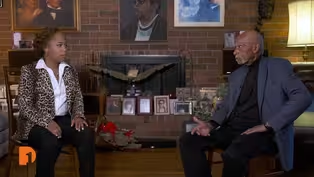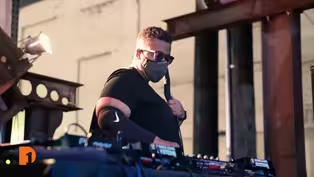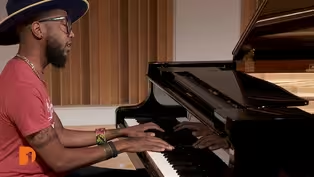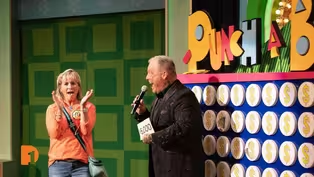
Gospel music, George Shirley, DJ Whodat, One Detroit Weekend
Season 9 Episode 32 | 26m 46sVideo has Closed Captions
African American religious music, George Shirley, DJ Whodat and some upcoming events.
It’s Black History Month and we’re shining a light on African American music. A Detroit pastor and a music professor examine the impact of Black religious music. Opera tenor George Shirley talks about his legendary career. DJ Whodat discusses the inspiration behind her unique music style. Plus, we’ll share some upcoming events happening around metro Detroit this weekend.
Problems playing video? | Closed Captioning Feedback
Problems playing video? | Closed Captioning Feedback
One Detroit is a local public television program presented by Detroit PBS

Gospel music, George Shirley, DJ Whodat, One Detroit Weekend
Season 9 Episode 32 | 26m 46sVideo has Closed Captions
It’s Black History Month and we’re shining a light on African American music. A Detroit pastor and a music professor examine the impact of Black religious music. Opera tenor George Shirley talks about his legendary career. DJ Whodat discusses the inspiration behind her unique music style. Plus, we’ll share some upcoming events happening around metro Detroit this weekend.
Problems playing video? | Closed Captioning Feedback
How to Watch One Detroit
One Detroit is available to stream on pbs.org and the free PBS App, available on iPhone, Apple TV, Android TV, Android smartphones, Amazon Fire TV, Amazon Fire Tablet, Roku, Samsung Smart TV, and Vizio.
Providing Support for PBS.org
Learn Moreabout PBS online sponsorship- [Narrator] Coming up on "One Detroit," it's Black History Month, and we're shining a light on African-American music.
We'll examine the emotional and spiritual impact of Black religious songs.
Plus, African-American opera singer George Shirley talks about his legendary career.
Also ahead, DJ Whodat explains the inspiration behind her unique music style.
And we'll close the show with some events and activities taking place this weekend in Metro Detroit.
It's all coming up next on "One Detroit."
- [Announcer] From Delta faucets to Behr paint, Masco Corporation is proud to deliver products that enhance the way consumers all over the world experience and enjoy their living spaces.
Masco, serving Michigan communities since 1929.
Support also provided by the Cynthia and Edsel Ford Fund for Journalism at Detroit PBS.
- [Announcer] DTE Foundation is a proud sponsor of Detroit PBS.
Among the state's largest foundations committed to Michigan-focused giving, we support organizations that are doing exceptional work in our state.
Learn more at dtefoundation.com.
- [Announcer] Nissan Foundation, and viewers like you.
(upbeat music) - [Narrator] Just ahead on "One Detroit," February is Black History Month, and we're sharing stories about African-American music.
The first Black tenor with the Metropolitan Opera explains why he became an opera singer.
Plus, Detroit's DJ Whodat talks about her love for music.
And we'll let you know what's happening around town this weekend and beyond.
But first up, we're taking a look at the power and influence of African-American religious music.
From the spirituals sung by the enslaved to contemporary gospel songs, Black religious music has a long history of evoking emotions and connecting cultures.
"American Black Journal" host and "One Detroit" contributor Stephen Henderson spoke with Reverend Larry Simmons of Baber Memorial AME Church, and Dr. Brandon Waddles, an assistant professor at Wayne State University about the role of music in the Black church.
(upbeat music) - One of my favorite jazz tunes is "Work Song," and my favorite version of that is the one recorded by Cannonball Adderley.
I listen to it all the time, and of course, it's jazz.
It's a jazz standard in many ways, but I don't know that everybody knows the history of that song, that it is a call to work songs, which were the way that enslaved Africans in this country made the burden of slavery just a little more bearable, right?
By singing, coming up with songs to pass the time, and survive the brutality of slavery.
And I tell that story to say that so much of our music today comes from that experience.
And of course, jazz is one form of that, but gospel is another.
And of course they are also tied together.
All of this is along this continuum that has its roots in our history.
So I think when we talk about gospel and the power of gospel in the Black church, we have to start with the power of song in the period where we were enslaved.
Brandon Waddles, did I get that history right?
- You have it absolutely correct.
How wonderful.
I've had the pleasure of serving as a music director for Legacy for the past five years, and she has been attributing the great Nina Simone who before has said has a very definitive setting of that same work song.
And it's so interesting, so powerful to realize that these songs that were birthed out of hard times have now become our uplift.
And it's just a testament to, I just think that the great potential within our community, the great fight that we have within us, that is not only within the negro spirituals of that time, but of African music that inspired it before, before we were even brought over here against our wishes.
And that translates into all of Black American music, that translates most to all of American music today.
And certainly gospel and jazz are no different from that.
So wonderful.
Thank you, historian.
- Yeah.
Reverend Simmons, talk about in your church and other Black churches, the role that this music plays now and how it connects to that history I was talking about.
- Let me say that music is fundamental to faith.
I'm not gonna take you all the way into the deep end of this, but you gotta know that the Bible actually says that the sound of God is like a trumpet.
This sense of music is intrinsic when in the Bible, in the Old Testament, when the Jewish nation was being divided, God created a special group of people called Levites, sons of Levi, one of whose primary functions was to bring music to worship.
The Bible's replete with stories of music being used by God to usher in the Holy Spirit before people would begin to prophesy.
If you go all the way to the end of Revelation, in the very first chapter, it says that the sound of God, the voice of God was like mighty waters, like the sound of a trumpet is what John says he heard.
Just understand that we are bringing forward a move of God which is as old as creation because the Bible says that God spoke and created the earth.
And it is intrinsic to us.
And I'm gonna tell you, I can't prove this Dr. Waddles would be able to speak to this far better than me, but there's something about African-Americans, really the African diaspora, there's something about us that the music we create, that music reverberates through every culture on the planet.
- Dr. Waddles, talk about how that influence I guess moves from Africa to enslavement here and then into the church through gospel and also of course meter and tempo and things that we see from Black preachers.
It becomes more than just, as Reverend Simmons is talking about, more than just a part of what we experience, it is what we experience.
- This story of translating music and African culture, the diaspora into the United States begins with our journey over here.
And to know that music was the universal language that helped us to communicate when we were speaking Igbo and Yoruba, we had so many different dialects and languages.
You have to realize that when we got over here, many of us did not know each other but to be able to communicate through the music.
And then when you had many of these missionaries who were coming down south to use Christianity, mind you as another enslaving mechanism, mind you that one scripture, slaves be good to your masters.
Well they made a mistake and also told us about Joshua fighting a bit in the Battle of Jericho and Daniel getting out of the lion's den.
And I tell them they really made a mistake when they talked about Jesus being crucified and dying but rising up in three days.
That was to us our story.
So we created music from those stories and we also used some of what we all called the old Watts tunes.
Isaac Watts, one of the great hymn writers of the day.
And so we formulated that with syncopation and polyrhythm.
We'd already had that, probably besides that, the most other most important aspect of that is that of the grio, the storyteller who is important to all the folk tradition.
But specifically in African diaspora, the grio is the community lead.
That means the grillo is the lead singer, it's the worship, they're the pastor.
So the grio finds their way in people like Reverend Simmons.
They find their way in figures like, oh my goodness, Steve, the father of African Methodism, and how we come to find Richard Allen, of course, how we come to find our own independent Black denomination sometime before we are actually freed from slavery.
- [Narrator] Turning now to a classical music trailblazer here in Metro Detroit.
Renowned operatic performer George Shirley was the first Black tenor to join the Metropolitan Opera in 1961.
He also holds other firsts as an African-American musician and educator.
"One Detroit" contributor Ceceloa Sharpe of 90.9 WRCJ sat down with Shirley for a conversation about his remarkable career.
(upbeat music) - I am here with Professor George Shirley, the first African-American member of the Army Chorus, the first African-American to teach music in Detroit public high schools, the first African-American male tenor to sing leading roles with the Metropolitan Opera, and the list goes on.
Let's rewind time just a little bit.
Professor Shirley, you really didn't have plans to be an opera singer.
You were about to get married and teach music in Detroit public schools.
And then what happened?
- Well, the Army happened, the draft happened, my life was set, my dreams were fulfilled.
And we were planning on getting married in August of 1956 and got a letter from Uncle Sam in about March or April 1956 saying basically "You're going to be married to me in June."
The word went out that the Army was going to create a singing organization to be attached to the United States Army Band in Washington DC.
The band had been formed in 1934, 35, and it had never had a Black member.
So I decided to go in as a bandsman.
So I went into the Army playing euphonium.
- How did you really matriculate into the world of opera?
- So along with two other members of the band who were not that happy with that prospect, both of them were white.
We decided to take a leave of absence and go to Washington and audition for the chorus.
The conductor of the chorus, a fellow named Samuel Loboda, he was a captain, he was second in command of the Army Band.
And my two colleagues sang their auditions.
And Loboda, who was very direct, he was a really incredible man, he said, "Well thank you very much for coming.
We won't be able to use you."
And I thought, mmm-mmm-mmm.
My turn came and I sang and he said, "Can you wait a few minutes" after I finished.
I said yes sir.
And he disappeared into the command room.
A few minutes became at least a half hour.
And I'm sitting there thinking, that's the same old stuff.
Same.
So he finally came out and he said, "Well, we decided that we would like to have you join us if it's what you really want."
I found out years later that Sam Loboda had to go all the way to the Pentagon to get me in.
That was America.
- Tell us about the value of a quality music education at the elementary level on up through high school.
- I didn't, I mean, I'd been singing ever since I was five years old with my parents in church in Indianapolis.
And then we came here and encountered one of the greatest systems of public school music education in the country in Detroit.
And for me, it's a primal force in educating people.
It doesn't mean that someone who has profited by studying music is going to become a necessarily a professional musician, but it means that the brain has been trained in certain ways that can be used, activated in professions that have nothing to do per se with music.
There are people who are CEOs of companies who are excellent musicians.
I mean, Einstein was a musician.
So you're taking away something that is essential, really essential in helping to grow the brain.
- You've taught at universities, you're teaching, you're a distinguished professor at the University of Michigan, but you also have a vocal competition that started about 11 years ago.
- I have a former student, Louise Toppin.
She and I came up with this idea of a vocal competition focused on the art songs and the classical compositions of African-American composers.
It has grown over the years to include university students.
Still has high school level.
And it has become international.
The University of Michigan School of Music, Theater, and Dance is now going to house this competition.
And it's a dream come true.
The music, the class is so-called classical music of Black composers has not really been made as accessible and has not been taught to the degree that it should be.
And that's being changed now at Michigan at the School of Music.
And it's open to all ethnicities because music belongs to everyone.
I don't care what you look like.
If I can sing Italian to Italians or French to the French or German to the Germans or anything else, then everybody has a right to sing the works of African-American composers.
I don't take credit for having been given the gift of song.
I had nothing to do with that.
I don't remember asking the intelligence the created me, can I be a singer, can I be an opera singer, can I be a teacher?
I was given the gift, and I was also given the work ethic to develop the gift.
(George singing in foreign language) - [Narrator] Detroit DJ and producer Terri McQueen, better known as Whodat, is a driving force in the city's electronic music scene and vibrant arts community.
"One Detroit" contributor Chien-An Yuan caught up with Whodat to talk about her love for house music and being an African-American woman in the music industry.
(upbeat music) (singer singing indistinctly) (people chattering) - Becoming an artist takes a lot of work.
For me, actually, the beginnings of it is learning to become an artist, believing that I was an artist.
I never considered myself an artist.
I think early on, I was trying to help other people with the things that they were doing and understanding things that needed to be done and helping them navigate through things.
And over time I just realized like, you really have to take care of these things like a job.
(upbeat music) I started to understand promotion better when I heard people talking about visibility.
So by the time I did movement, there's not many people that look like me that do movement.
There's usually just a certain few.
So understanding that like people need to see that because that's not something that I had seen when I was younger, and probably after movement, I started seeing more people that look like me and they're like, "Yo, I seen you here, I heard you here.
I had heard about you, but now I'm seeing you more.
And you inspire me to do it.
It lets me know that I can do it.
When I get frustrated it's like, well she got here, then I know I can get there.
I'm just gonna have to like work through whatever I need to work through to get there."
And it's important.
(upbeat music) (upbeat music) Being from Detroit and making music is we stick to what we know.
This is what I'm doing and how I'm going to do it.
And I'm not changing my mind.
I don't care what you think.
I don't care what you like.
I don't care what you don't like.
When you're creating art, you're not necessarily thinking about like, yeah, everyone's gonna love this or like this.
You're just getting your creative output out.
It's what people need to do.
But when the money comes into it you're like, oh man, I might lose my livelihood or I might lose my house or I might, well I already lost my house, I don't really care, I have nothing to lose.
Because I've already been through that.
What else you got?
And that's a Detroit thing.
People getting laid off or losing their job and plants closing and somebody being on drugs or somebody dying at an early age or them just having a hard life growing up or you getting like in a car accident or just whatever.
It's just like our makeup, like yo, I don't really care.
Like I'm working to get here and this is where I'm going.
You're either in it for the ride or you can get out.
That's it.
My new toy, my first, maybe second mode, because this actually is the first one, the work stack, but you had to put together like a little kid.
So probably mostly bass lines with this and experimentation.
So we made the main bass line on, don't know from this sequential, but we have no idea what patch it was.
It's somewhere in here, but that's fine because that song's finished.
I wanted to make it timeless.
(upbeat music) - If you're a good person and you have a good heart, most things are probably just coming to you.
For a long time, I felt undeserving of the things that were coming to me because I hadn't been doing this for a long time, but my mom was like, she explained to me, you have to understand, you never look at all the things that you do for other people, and you've always done that, and you've always been that person.
So everything that you have coming to you, those are just things that you have already done.
Knowing that, I understand like, well this needs to be seen so that people can start understanding like, okay, you can do this too, and you can get over there.
You can be where I am.
- [Narrator] Let's take a look at what's happening in Metro Detroit this weekend and beyond.
From Black History Month events to musical theater productions and a live game show, there's something that's sure to capture your interest.
Peter Whorf and Haley Taylor of 90.9 WRCJ have today's One Detroit Weekend.
- Hey Haley, it looks like we have some great shows and events happening again this weekend and beyond.
What do you have for us?
- All right, February is Black History Month and I love Steppin' is presenting at the Stepper's Ball, "Steppin' Into Black History Month" on Friday, February 7th, where attendees will enjoy an evening of Chicago style steppin'.
Don't worry if you don't know the moves.
There's an introductory hour from six to 7:00 PM where you can learn how to groove.
- I would to learn how to step like that.
Also, February 7th, "Ruby: The musical" comes to the Music Hall Center for the Performing Arts.
The show is based on the true story of Ruby McCollum, a successful Black woman who was accused of murdering a white doctor in the south in 1952.
The musical encompasses the emotion stirred by the racism happening at the time.
- [Haley] On Sunday, 313 Comedy presents their stand-ups at Detroit Shipping Company.
This is a weekly Sunday evening event to get you laughing at the start of the work week.
- [Peter] We can all use some of that.
Starting February 11th is "Come From Away."
It's a musical based on the real story of when residents of Gander, Newfoundland cared for thousands of stranded airline passengers after September 11th.
- Have you ever wanted to be in a game show?
- Of course.
Who hasn't?
- Exactly.
Well, February 12th marks your chance to come on down and play when "The Price is Right Live" presents its interactive show at the Fox Theater.
Randomly chosen audience members will get their chance to play the classics.
Plinko, Cliffhangers, spin the big wheel, and more.
- That sounds like a blast.
Of course there's much more to do around the city, so stay tuned to learn more about a few other events.
Have a great weekend.
(upbeat music) - [Narrator] And that'll do it for this week's "One Detroit."
Thank you for watching.
Head to the "One Detroit" website for all the stories we're working on.
Follow us on social media, and sign up for our weekly newsletter.
- [Announcer] From Delta faucets to Behr paint, Masco Corporation is proud to deliver products that enhance the way consumers all over the world experience and enjoy their living spaces.
Masco, serving Michigan communities since 1929.
Support also provided by the Cynthia and Edsel Ford Fund for Journalism at Detroit PBS.
- [Announcer] DTE Foundation is a proud sponsor of Detroit PBS.
Among the state's largest foundations committed to Michigan-focused giving, we support organizations that are doing exceptional work in our state.
Learn more at dtefoundation.com.
- [Announcer] Nissan Foundation, and viewers like you.
(upbeat music) (bright music)
African American opera tenor, trailblazer George Shirley
Video has Closed Captions
Clip: S9 Ep32 | 6m 51s | African American opera tenor George Shirley reflects on his trailblazing music career. (6m 51s)
Detroit DJ Whodat talks house music, Black women artistry
Video has Closed Captions
Clip: S9 Ep32 | 5m 28s | Detroit DJ Whodat talks about being an African American woman in the music industry. (5m 28s)
The history, influence of African American religious music
Video has Closed Captions
Clip: S9 Ep32 | 7m 47s | Religious leaders from Detroit explore the history and influence of Black religious music. (7m 47s)
Things to do around Detroit this weekend: February 7, 2025
Video has Closed Captions
Clip: S9 Ep32 | 1m 58s | Black History Month events, upcoming performances and more happening this weekend. (1m 58s)
Providing Support for PBS.org
Learn Moreabout PBS online sponsorshipSupport for PBS provided by:
One Detroit is a local public television program presented by Detroit PBS















